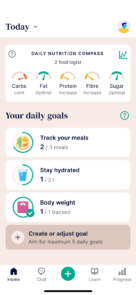
Treatments for obesity in the UK
Are you currently living with obesity and struggling to lose weight? There are a variety of treatment options available, from lifestyle adjustments around nutrition and exercise, to medications like weight loss injections. If you have a BMI over 35 and a weight-related health condition, you may benefit greatly from Oviva’s expert support.
Oviva is accredited by the NHS and our service is recommended by 97% of users. Our team of specialists, including doctors, nurses and dietitians, can support you with a combination of treatment options, including prescription weight loss injections.
Key Takeaways
- Obesity is most commonly defined as a body mass index (BMI) of 35 and above.
- If you’re living with obesity, treatment options include lifestyle and behaviour changes around food and exercise, prescription medication, or surgical treatments.
- For those who are eligible, Oviva’s weight management programme can help you to lose weight and maintain weight loss in the long term.
- We provide expert support, prescription weight loss medication and a free mobile app.
What is obesity?
Obesity is most commonly defined as a body mass index (BMI) over 35. If you have a BMI over 40, you’re classed as living with severe obesity. A BMI of 27.5 and above is used to define obesity for people from Asian, Middle Eastern, African-Caribbean and Black African backgrounds. People from these backgrounds experience equivalent health risks at a lower BMI.
As a metric, BMI is not ideal for all body types. For instance, if you have a lot of muscle mass, you may have a high BMI despite having a relatively low amount of body fat. However, for most people, it provides a good estimate of whether your weight means you’re at an increased risk of experiencing health problems, including cardiovascular disease and type 2 diabetes.
An alternative is to measure your waist to height ratio. This is calculated by dividing your waist measurement by your height, using the same metric. So, for example, if you measure your waist in centimetres, you should do the same for your height. A waist to height ratio of 0.5 or higher means you have an elevated risk of weight-related health problems.
For example: if your waist is 110cm and your height is 165cm, your waist to height ratio is:
110 ÷ 165 = 0.67
This is classed as high-level risk.
Treating obesity in the UK
There are a number of options available for treating obesity. The precise treatment for obesity NHS doctors recommend will usually depend on your specific circumstances.

Lifestyle and behaviour changes
The first-line treatment if you have a BMI over 35 is to make some lifestyle and behaviour changes related to what you eat and the amount of exercise you get. Many people will achieve great weight loss results if they successfully implement these changes and stick with them.

Diet and nutrition
One of the biggest lifestyle changes you can implement to try to lose weight is to make adjustments to what you eat. In particular, you should try to focus on fruit, vegetables, lean proteins and foods that have a high fibre content. Try to cut back on red and processed meats and high-fat snacks and try to replace sugary drinks with water.
Try to consume five portions of fruit and vegetables per day. A portion is typically described as an 80g serving – a good way to achieve this is to have at least two vegetables with main meals.
You can also use this to help judge portion sizes. The NHS recommends filling half your plate with vegetables (e.g. corn, tomatoes, lettuce, etc.), a quarter of your plate with lean proteins (e.g. chicken, fish, tofu, etc.) and a quarter of your plate with carbohydrates (e.g. rice, potatoes, pasta, etc.).
The Oviva programme provides support from dietitians, to help you make sensible choices.

Physical activity guidelines
Exercise also plays a key role in NHS obesity treatment. You should try to increase the amount of physical activity you do. You can start slowly and gradually build your exercise levels up.
The NHS recommends being physically active for 150 hours a week. You can break this down into short, manageable sessions. Examples of some of the exercises you might opt for include walking, swimming, cycling and yoga, but try to focus on a physical activity you enjoy.
Medical treatments for obesity in the UK
In addition to lifestyle and behavioural changes, there are a variety of medical treatments for obesity the NHS can provide. These NHS obesity treatments are more likely to become options if you try to make lifestyle changes and do not achieve weight loss.
Oviva is an NHS-funded weight management programme that can support people living with obesity.
Oviva patient success stories:

 -22kg
-22kg
Heidi (53)

 -25kg
-25kg
Martin (34)

 -32kg
-32kg
Patricia (53)
Prescription medication
A variety of prescription obesity and weight loss medications have been approved for NHS use. These include the weight loss injections semaglutide (commonly distributed as Wegovy when used for weight loss) and liraglutide (commonly distributed as Saxenda).
These weight loss medications are prescribed by the NHS in combination with an approved weight management programme, like Oviva. The general eligibility criteria is a BMI over 35 with relevant other health conditions. Examples of relevant health conditions include:
- Asthma
- Depression
- Type 2 diabetes
- Heart disease
- Gallbladder problems
- Sleep apnoea
- Polycystic ovary syndrome (PCOS).
Many weight loss medications work by suppressing your appetite, so you naturally eat less. They should be combined with wider lifestyle changes, like increased exercise and better nutrition, which is why support from specialists is so important.
Semaglutide can be prescribed for a maximum of two years as part of a specialist weight loss service.
Find out more about how to get weight loss injections on the NHS.
Bariatric surgery
If you’re living with severe obesity (BMI over 40), you may be eligible for bariatric surgery, or weight loss surgery. Examples include gastric bypass, gastric band and gastric balloon. The aim of bariatric surgery is to make the stomach smaller, so you feel full sooner and eat less.
Endoscopic procedures for obesity
An endoscopic sleeve gastroplasty (ESG) is a minimally invasive procedure, recently approved for treating obesity in the NHS. It’s carried out under general anaesthetic and involves passing a flexible tube (endoscope) through the mouth down to your stomach. A small suturing device attached to the tube then stitches parts of your stomach together to decrease its size.

How Oviva can enhance your treatment
How is obesity treated by the team of specialists at Oviva? If you’re eligible, we’ll provide comprehensive support, including coaching and dietary advice, along with prescription medication when appropriate. You’ll gain access to a free smartphone app, allowing you to track activity, nutrition, your mood and other aspects of your weight loss journey.
Integrating Oviva’s services with conventional treatments of obesity, like lifestyle and behavioural changes, can improve outcomes and make weight loss more sustainable.
Navigating NHS criteria
NHS criteria for referral to a weight management programme is typically a BMI over 35 and relevant other medical conditions.
You can speak to your GP to find out if you’re eligible for a programme like Oviva’s. If you are, they can make a quick and easy referral for you.
Once you’re part of the Oviva programme, you can access treatment covered by the NHS and (if appropriate) prescription medication for the standard price of a prescription.







